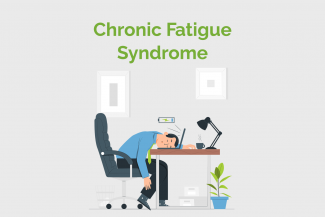Crushing tiredness that doesn’t diminish with rest, CFS can wreck lives. It’s also hard to diagnose, so patients may be seen as hypochondriacs. CFS affects more women than men and is seen mostly between the ages of 30 and 50. The true incidence of CFS is hard to gauge as it often goes undiagnosed due to its varying symptoms.

Diet guidelines
Nutritionists advise on eating right as it increases energy levels, strengthens immunity and helps one feel better. Extreme diets should be avoided as they can worsen your symptoms. Eat a balanced diet that includes vegetables, grains, fruits, protein and dairy.
Certain foods can trigger symptoms or make them worse. Such foods are:
- Fatty and fried foods
- Monosodium glutamate (MSG)
- Nutrasweet (aspartame)
- Cigarettes or tobacco products
Things like alcohol, caffeine and sugary foods that can disturb sleep should be avoided too.
Some people believe a serotonin-rich diet helps better regulate sleep and depression symptoms. Such foods may include complex carbohydrates and dark chocolate.
Changed
20/Jul/2017
Condition











